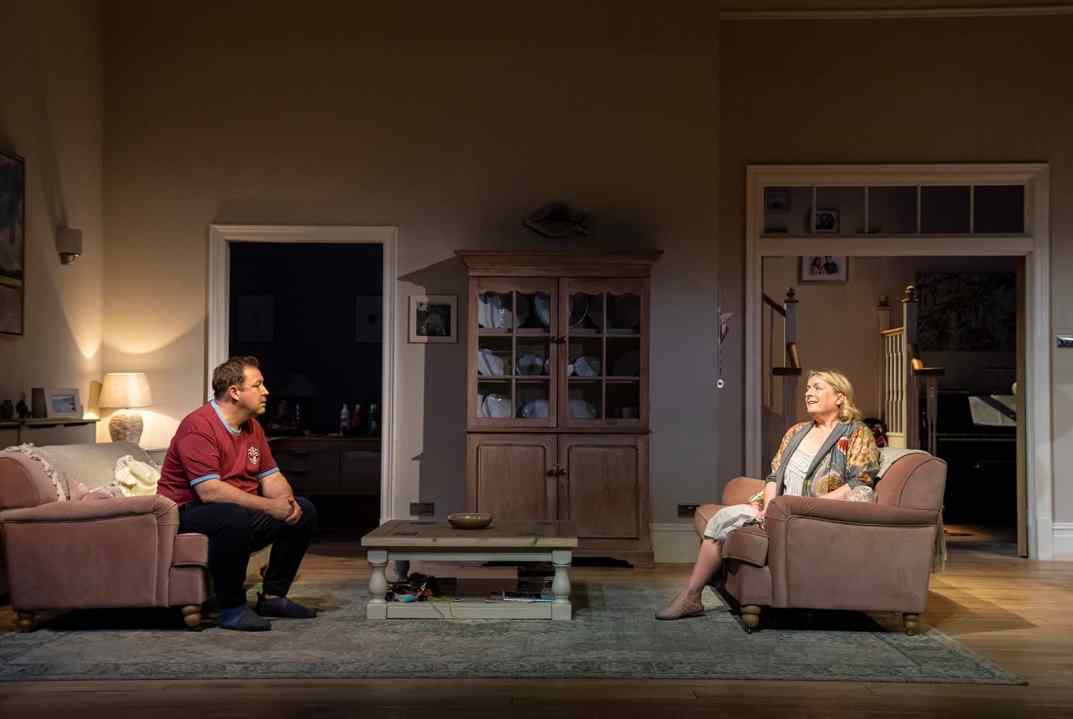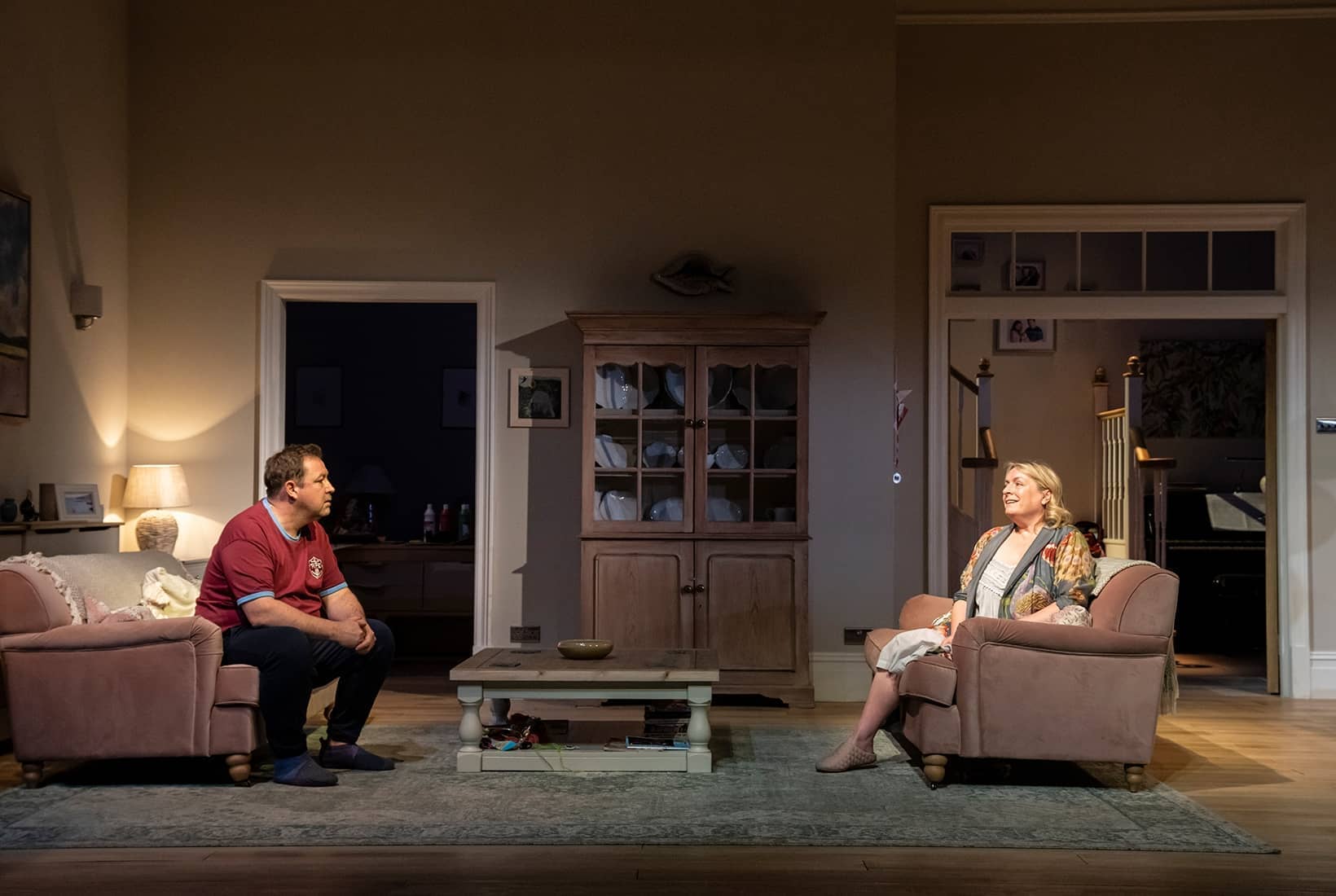‘I fink I doan luv yew any maw.’ A marital bust-up drama at the National Theatre opens with a whining Cockney, Maggie, telling her City whizzkid husband Gary that their relationship is over. Gary and Maggie are aspriring underclass types who’ve achieved bourgeois prosperity: John Lewis kitchen, vintage wine rack and a ceramics collection. They have an eight-year-old daughter at a private school where she learns ballet steps and the piano instead of watching road-rage videos on YouTube like a council-house kid. She’s called Annabelle, by the way, and one wonders if Gary and Maggie style themselves ‘Garfield and Margaret’ at the school gate.
It’s hard to know why a play-goer would care about these two doughnut-shaped crybabies
The writer, being male, portrays Garfield as a sweet, innocent toiler whose only sin is to neglect the selfish, hard-hearted Margaret. After starting a drippy friendship with a policeman – ‘we kissed’ – Margaret decides to destroy her marriage without a thought for the emotional damage this will inflict on her child. If she were a svelte, witty charmer she might attract our sympathy for rejecting her dull but reliable oaf of a husband but she’s a champion misery guts who hasn’t washed her hair since Theresa May was home secretary and who slobs around the kitchen in a nylon bed-coat that would look too cheap for the set of Mrs Brown’s Boys. She’s snobbish as well and she reminds Garfield that she has a degree and listens to Radio 4. He retaliates by posing as an avid reader whose books include My Story by Steven Gerrard. That quip is aimed at the NT’s snooty prole watchers who’d find it amusing to see a barrow boy equating a sportsman’s memoir with literature.
The couple’s finances are a puzzle. They have two incomes and they own a six-bedroom house in London but when Margaret visits Crouch End she breaks down in tears because she can’t afford a skirt from a yummy-mummy shop. Surely she can. Garfield shares his wife’s habit of blubbing for no reason. It’s hard to know why a play-goer would care about these two doughnut-shaped crybabies who’ve amassed millions but can’t stop weeping over microscopic defects in their lives. To complete the celebration of self-pity, the programme contains three essays by therapy experts explaining how natural it is to feel trapped, sad, and broken like the moaning deadbeats on-stage. The script, incidentally, is entirely devoid of tension or narrative interest. Two hours of bickering is all you get, plus the odd spot of vandalism as an overpriced fruit bowl is flung at a De’Longhi coffee machine. Neither spouse has the slightest interest in anything – politics, art, history, travel or thought – that lies outside the scope of their cossetted narcissism. Towards the end, a reconciliation seems possible. Garfield and Margaret wobble towards each other and spread their arms out tenderly. Their beer guts touch. But their lips remain a yard apart. They’ll need to lose three stone each to manage a kiss.
Himmler is the big selling point of The End of the Night by Ben Brown. It’s April 1945 and the war is nearly over. Himmler has just attended Hitler’s birthday party in the bunker and after helping the Führer to blow out the candles, he rushes off to a radio studio to deliver a stirring speech to his countrymen. Next, a secret meeting with a member of the World Jewish Congress, Norbert Masur. Himmler has realised, rather late in the day, that murdering six million people was a bad move, career-wise, and he wants to drum up some favourable publicity from the Jewish community. Masur, who was raised in Germany, suppresses his hatred of the SS chief and urges him to liberate all the remaining death camps. Himmler refuses and they negotiate the release of a few female captives.
Also present is Himmler’s physiotherapist, Felix Kersten, who recommends a massage to ease his patient’s stomach pain. Masur withdraws. Himmler strips to his jodhpurs and Kersten proceeds to knead his aching tummy. It’s like a barber’s appointment. They discuss this and that: Himmler’s children, his love life, the Führer’s state of mind, the Russian advance. Kersten suggests that Himmler should abandon Hitler and take over Germany himself. Himmler agrees. His hope is to join the Americans in a new anti-Bolshevik force that will chase the Russians back to Moscow. This dialogue unbalances the play. It’s unclear whether the central issue is the Final Solution or Himmler’s post-war career plans. Even a closing speech by a Holocaust survivor feels like an afterthought. The show is dominated by Richard Clothier (Himmler), who seems ill-suited to the role. Himmler was a bespectacled wimp who resembled a part-time curator at a jigsaw museum. Clothier is a strapping athlete who struts around like a millionaire womaniser in an Agatha Christie thriller looking for flappers to seduce. Unwittingly, he’s the hero of the piece. That can’t be right.








Comments